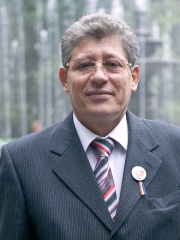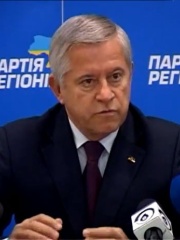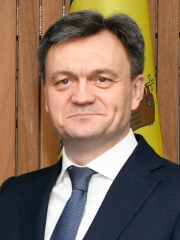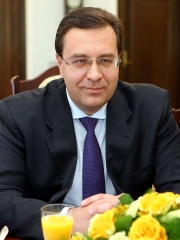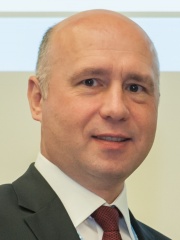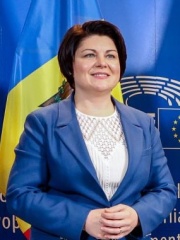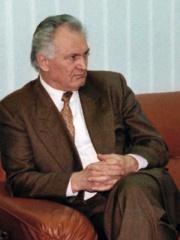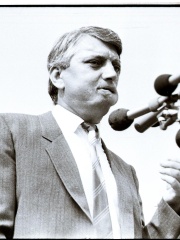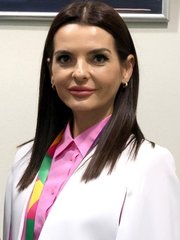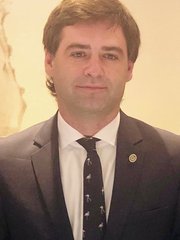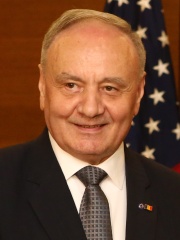
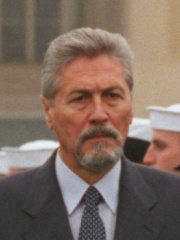
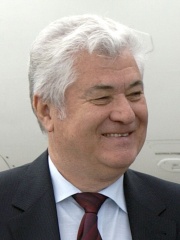
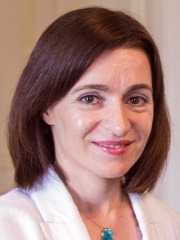
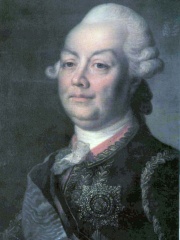
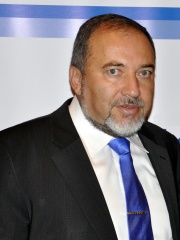
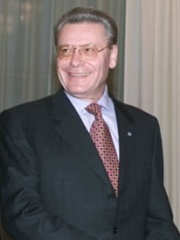
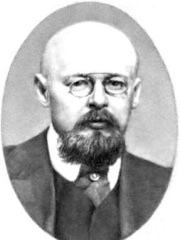
The Most Famous
POLITICIANS from Moldova
This page contains a list of the greatest Moldovan Politicians. The pantheon dataset contains 19,576 Politicians, 35 of which were born in Moldova. This makes Moldova the birth place of the 82nd most number of Politicians behind Cyprus, and Nepal.
Top 10
The following people are considered by Pantheon to be the top 10 most legendary Moldovan Politicians of all time. This list of famous Moldovan Politicians is sorted by HPI (Historical Popularity Index), a metric that aggregates information on a biography's online popularity. Visit the rankings page to view the entire list of Moldovan Politicians.

1. Nicolae Timofti (b. 1948)
With an HPI of 67.95, Nicolae Timofti is the most famous Moldovan Politician. His biography has been translated into 55 different languages on wikipedia.
Nicolae Timofti (Romanian: [nikoˈla.e tiˈmofti]; born 22 December 1948) is a Moldovan jurist and politician who was President of Moldova from 23 March 2012 until 23 December 2016. He served as head of Moldova's Superior Magistrate Council and was elected President by parliament on 16 March 2012.

2. Emil Constantinescu (b. 1939)
With an HPI of 67.36, Emil Constantinescu is the 2nd most famous Moldovan Politician. His biography has been translated into 41 different languages.
Emil Constantinescu (Romanian pronunciation: [eˈmil konstantiˈnesku] ; born 19 November 1939) is a Romanian professor and politician, who served as the president of Romania from 1996 to 2000. After the Romanian Revolution of 1989, Constantinescu became a founding member and vice president of the Civic Alliance (AC). In addition, he also served as the acting president of the Democratic Romanian Anti-Totalitarian Forum, the first associative structure of the democratic opposition in post-1989 Romania, which was later transformed into a centre-right political and electoral alliance known as the Romanian Democratic Convention (CDR). He subsequently presided over the People's Action (AP) party from the early 2000s until it merged into the National Liberal Party (PNL) in 2008. Nowadays, Constantinescu remains involved in Romanian politics, to a limited extent.

3. Vladimir Voronin (b. 1941)
With an HPI of 67.32, Vladimir Voronin is the 3rd most famous Moldovan Politician. His biography has been translated into 50 different languages.
Vladimir Voronin (Romanian: [vladiˈmir voˈronin]; born Vladimir Bujeniță, 25 May 1941) is a Moldovan politician. He was the third President of Moldova from 2001 until 2009 and has been the leader of the Party of Communists of Moldova (PCRM) since 1994. He was Europe's first democratically elected communist party head of state after the dissolution of the Eastern Bloc.

4. Maia Sandu (b. 1972)
With an HPI of 67.30, Maia Sandu is the 4th most famous Moldovan Politician. Her biography has been translated into 81 different languages.
Maia Sandu (Romanian: [ˈmaja ˈsandu]; born 24 May 1972) is a Moldovan politician who has served as the sixth president of Moldova since 2020. She is the founder and former leader of the Party of Action and Solidarity (PAS) and was prime minister of Moldova from June to November 2019, when her government collapsed after a vote of no-confidence. Sandu was minister of education from 2012 to 2015 and member of the parliament of Moldova from 2014 to 2015, and again in 2019. Sandu was elected president of Moldova in a landslide victory during the 2020 Moldovan presidential election. The first female president of Moldova, Sandu is a strong supporter of the accession of Moldova to the European Union, overseeing Moldova's granting of candidate status, and is widely considered "pro-Western". She has criticised and opposed Russia's invasion of Ukraine and supported subsequent steps to reduce Moldova's economic dependence on Russia, frequently expressing sympathy and support for Ukraine in the conflict. Sandu has made anti-corruption, economic reform and liberalisation a central part of her political platform, as well as closer integration with Europe. In February 2023, she accused Russia of seeking to stage a coup of the Moldovan government and has continued to seek to reduce Russia's influence over the country. Sandu was re-elected president in the 2024 Moldovan presidential election.
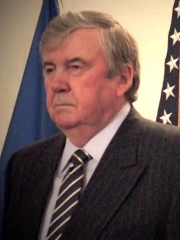
5. Mircea Snegur (1941 - 2023)
With an HPI of 66.64, Mircea Snegur is the 5th most famous Moldovan Politician. His biography has been translated into 38 different languages.
Mircea Snegur (Romanian: [ˈmirtʃe̯a ˈsneɡur]; 17 January 1940 – 13 September 2023) was a Moldovan agronomist and politician who served as the first President of Moldova from 1990 to 1997. Prior to that, he served as the Chairman of the Presidium of the Supreme Soviet of the Moldavian SSR from 1989 to 1990 and chairman of the Supreme Soviet from 27 April to 3 September 1990.

6. Pyotr Rumyantsev (1725 - 1796)
With an HPI of 64.95, Pyotr Rumyantsev is the 6th most famous Moldovan Politician. His biography has been translated into 31 different languages.
Count Pyotr Alexandrovich Rumyantsev-Zadunaisky (Russian: Пётр Алекса́ндрович Румя́нцев-Задуна́йский; 15 January [O.S. 4 January] 1725 – 19 December [O.S. 8 December] 1796) was one of the foremost Russian military commanders of the 18th century, widely considered to be one of Russia's greatest military leaders and is referred to as one of the greatest commanders in military history. As a commander, he is placed on par with Alexander Suvorov. Rumyantsev used mobile divisional squares for the first time in history as opposed to linear battle orders and initiated the formation of light (jaeger) battalions in the Russian Army, which operated in a scattered order. He governed Little Russia in the name of Empress Catherine the Great from the abolition of the Cossack Hetmanate in 1764 until Catherine's death 32 years later. Monuments to his victories include the Kagul Obelisk in Tsarskoye Selo (1772), the Rumyantsev Obelisk on Vasilievsky Island (1798–1801), and a galaxy of Derzhavin's odes.

7. Avigdor Lieberman (b. 1958)
With an HPI of 64.51, Avigdor Lieberman is the 7th most famous Moldovan Politician. His biography has been translated into 42 different languages.
Avigdor Lieberman (Hebrew: אביגדור ליברמן, romanized: Avigdor Liberman, IPA: [aviɡˈdor ˈliberman] ; born 5 June 1958) is a Soviet-born Israeli politician who served as Minister of Finance between 2021 and 2022, having previously served twice as Deputy Prime Minister of Israel from 2006 to 2008 and 2009 to 2012. Born and raised in Soviet Moldova, Lieberman immigrated to Israel with his family in 1978. He entered the Knesset in 1999, and has served in numerous roles in the government, including as Minister of National Infrastructure, Minister of Transportation, and Minister of Strategic Affairs. He served as Deputy Prime Minister under Prime Ministers Ehud Olmert and Benjamin Netanyahu. He served under Netanyahu as Minister of Foreign Affairs from 2009 to 2012 and 2013 to 2015 and as Minister of Defense from 2016 to 2018. On 14 November 2018, he resigned as Defense Minister because of a ceasefire in Gaza which he characterized as "surrendering to terror." He is the founder and leader of the secular nationalist Yisrael Beiteinu (Israel Our Home) party, whose electoral base initially consisted overwhelmingly of Russian-speaking immigrants from the former Soviet Union, but later attracted broader support. Lieberman has stated his opposition to forming a coalition with religious parties and refused to join Benjamin Netanyahu's coalition in April 2019. As a result of the arrival in Israel during the 1990s of about one million Russian-speaking immigrants, Yisrael Beiteinu has regularly played the "king-maker" role in Israel's coalition governments. He was replaced in the Knesset by Elina Bardach-Yalov when he became the finance minister. Lieberman is a polarizing figure in Israeli politics due to his hardliner positions on the Israeli-Palestinian conflict. His name is associated with the 2004 Lieberman Plan, which advocates land swaps between Israel and the Palestinian Authority and the barring of Arab Israelis from Israeli citizenship unless they swear a loyalty oath to Israel. While this has been decried as discriminatory, this however makes him unique among right-wing Israeli figures in that he is not categorically opposed to any form of two-state solution and even ready to cede land from the pre-1967 borders. He is nonetheless also known for rhetoric considered violent and hawkish in times of military escalation. During the 2018–2019 Gaza border protests and the Gaza war, he iterated that there are "no innocents in Gaza".

8. Petru Lucinschi (b. 1940)
With an HPI of 63.37, Petru Lucinschi is the 8th most famous Moldovan Politician. His biography has been translated into 31 different languages.
Petru Lucinschi (Romanian: [ˈpetru luˈtʃinski]; born 27 January 1940) is a former Moldovan politician who was Moldova's second President from 1997 to 2001. He currently serves as the founder and head of the Lucinschi Foundation of Strategic Studies and International Relations.

9. Vladimir Purishkevich (1870 - 1920)
With an HPI of 62.92, Vladimir Purishkevich is the 9th most famous Moldovan Politician. His biography has been translated into 21 different languages.
Vladimir Mitrofanovich Purishkevich (Russian: Влади́мир Митрофа́нович Пуришке́вич, [pʊrʲɪˈʂkʲevʲɪt͡ɕ]; 24 August [O.S. 12 August] 1870 – 1 February 1920) was a Russian politician and right-wing extremist known for his monarchist, ultra-nationalist, antisemitic and anticommunist views. He helped lead the paramilitary Black Hundreds during the Russian Revolution of 1905. He later served in the State Duma, where he gained a reputation for courting of public controversy. Together with Felix Yusupov and Dmitri Pavlovich he took part in the assassination of Grigori Rasputin in late 1916. After the February Revolution, Purishkevich was one of the only leaders of the Black Hundreds to remain politically active. He eventually joined the White movement and died from typhus in 1920.
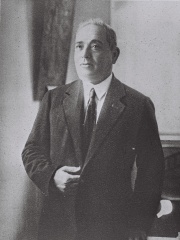
10. Meir Dizengoff (1861 - 1936)
With an HPI of 61.85, Meir Dizengoff is the 10th most famous Moldovan Politician. His biography has been translated into 21 different languages.
Meir Dizengoff (Hebrew: מֵאִיר דִּיזֶנְגּוֹף; born Meer Yankelevich Dizengof, Russian: Меер Янкелевич Дизенгоф); 25 February 1861 – 23 September 1936) was a Zionist leader and politician and the founder and first mayor of Tel Aviv (1911–1922 as head of town planning, 1922–1936 as mayor). Dizengoff's actions in Ottoman Palestine and the British Mandate for Palestine helped lead to the creation of the State of Israel. David Ben-Gurion declared Israeli independence in 1948 at Dizengoff's residence in Tel Aviv. Dizengoff House is now Israel's Independence Hall.
People
Pantheon has 35 people classified as Moldovan politicians born between 1725 and 1986. Of these 35, 28 (80.00%) of them are still alive today. The most famous living Moldovan politicians include Nicolae Timofti, Emil Constantinescu, and Vladimir Voronin. The most famous deceased Moldovan politicians include Mircea Snegur, Pyotr Rumyantsev, and Vladimir Purishkevich. As of April 2024, 2 new Moldovan politicians have been added to Pantheon including Evghenia Guțul, and Nicu Popescu.
Living Moldovan Politicians
Go to all RankingsNicolae Timofti
1948 - Present
HPI: 67.95
Emil Constantinescu
1939 - Present
HPI: 67.36
Vladimir Voronin
1941 - Present
HPI: 67.32
Maia Sandu
1972 - Present
HPI: 67.30
Avigdor Lieberman
1958 - Present
HPI: 64.51
Petru Lucinschi
1940 - Present
HPI: 63.37
Mihai Ghimpu
1951 - Present
HPI: 61.01
Anatoliy Kinakh
1954 - Present
HPI: 58.85
Dorin Recean
1974 - Present
HPI: 58.38
Marian Lupu
1966 - Present
HPI: 56.19
Pavel Filip
1966 - Present
HPI: 55.82
Natalia Gavrilița
1977 - Present
HPI: 55.77
Deceased Moldovan Politicians
Go to all RankingsMircea Snegur
1941 - 2023
HPI: 66.64
Pyotr Rumyantsev
1725 - 1796
HPI: 64.95
Vladimir Purishkevich
1870 - 1920
HPI: 62.92
Meir Dizengoff
1861 - 1936
HPI: 61.85
Ion Ciubuc
1943 - 2018
HPI: 57.08
Valeriu Muravschi
1949 - 2020
HPI: 56.22
Ivan Calin
1935 - 2012
HPI: 54.21
Newly Added Moldovan Politicians (2025)
Go to all RankingsOverlapping Lives
Which Politicians were alive at the same time? This visualization shows the lifespans of the 7 most globally memorable Politicians since 1700.

